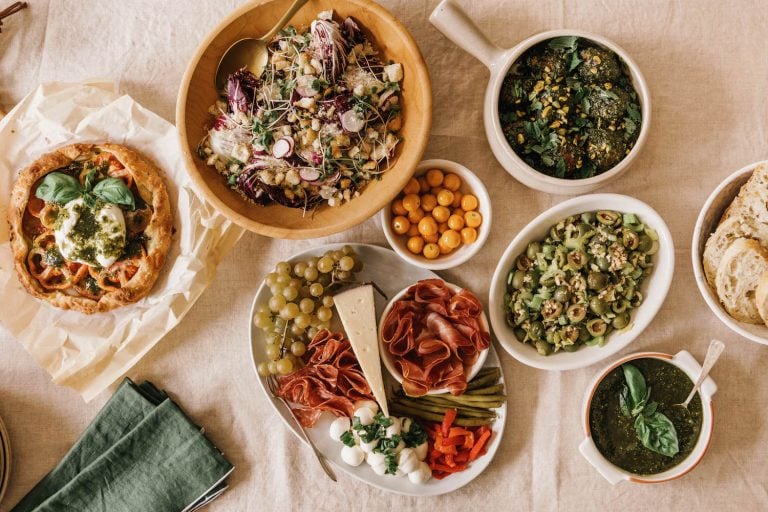
Ready or not, the holidays are upon us. And while this time of year brings forth all-things merry, bright, and absolutely delicious, the bounty of the holiday season is a slippery slope. Be it one too many slices of pie or an extra treat with your morning coffee, it’s easy to feel less than stellar come January 1. And feeling sluggish, guilty, or anything less than grateful isn’t the goal. So, where’s the happy medium? Fortunately, you can celebrate the holidays without sacrificing your health. And we have just the action plan for you.
Whether or not you have diabetes, read on to learn our top tips to create a blood sugar-friendly holiday season. Our hope is that you’ll feel vibrant, healthy, and happy when the clock strikes midnight on December 31. In turn, you won’t need to “get back on track” in early 2023.
Feature image by Kristen Kilpatrick.

Optimal Health Starts With Nutrition
When it comes to optimal health, there are a few foundational pieces to the puzzle: quality sleep, daily movement, self-care (this includes minimizing stress!), and quality nutrition. Of this list, what’s on your plate is at the tippy top. After all, food fuels every cell in the body. Therefore, understanding what’s best for you can make all the difference. If you’re not sure where to begin, this meal plan is a great place to start. Ultimately—as bio-individuals—we all have different nutritional needs, food preferences, and cravings. Yet one thing remains universal: stable blood sugar.
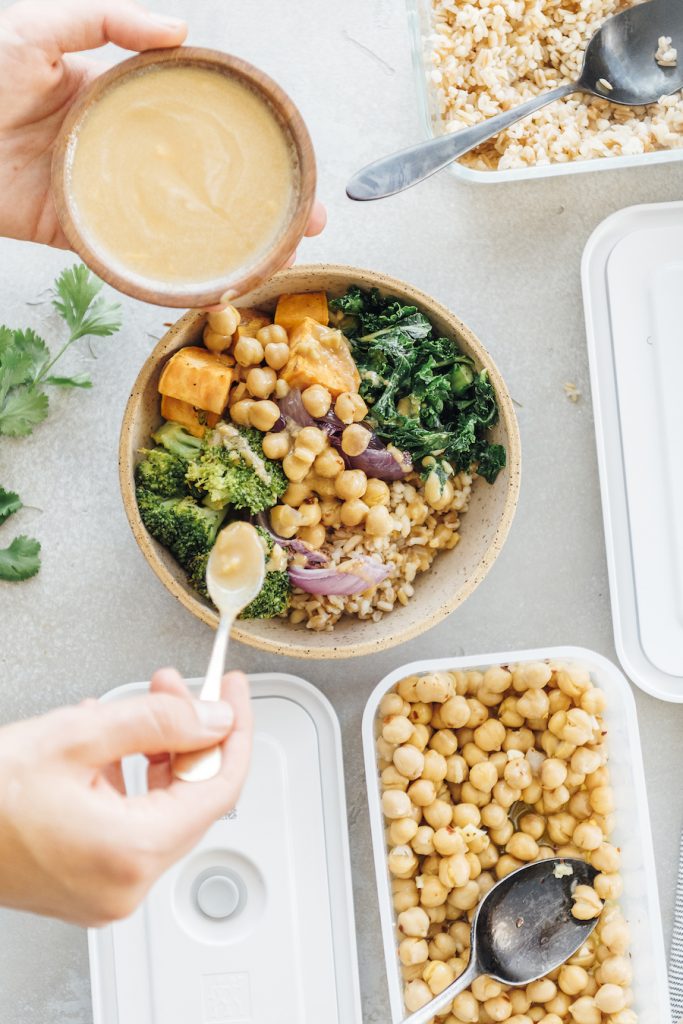
Everyone Benefits From Balanced Blood Sugar
First and foremost, everyone benefits from stable blood sugar—not just pre-diabetics and diabetics. It’s instrumental for both near-term and long-term health. Personally, it helped me put my PCOS into remission. It also improved my relationship with food and my body. To say I’m passionate about blood sugar is an understatement. To this day, I teach my clients how to balance their blood sugar for better sleep, hormone health, and optimized fertility. For good reason, it’s a hot nutrition topic. Before we dive into how to create a blood sugar-friendly holiday season, let’s cover the basics.

What is blood sugar?
When it comes to having more energy, optimizing your well-being, body composition goals, minimizing chronic disease, etc. we want to keep blood sugar balanced. But, what is blood sugar? Without knowing exactly what it means, you’ve probably heard of the term. Balancing blood sugar is key—it plays a role in everything from sleep to cognitive function. In fact, you may already be familiar with spikes and dips in blood sugar. Hello, hanger! That said, few recognize its affects on a daily basis.
Blood sugar = The amount of sugar (glucose) in your blood at any given time.
Sugar, or glucose, is the body’s main source of energy. The term “blood sugar” refers to the amount of energy (sugar) present in our bloodstream at one set time. Sugar is produced when we break down any form of carbohydrate. Be it an orange, pecan pie bar, or a piece of toast, that carb is absorbed into our bloodstream. Immediately or eventually, carbohydrates are used as fuel.
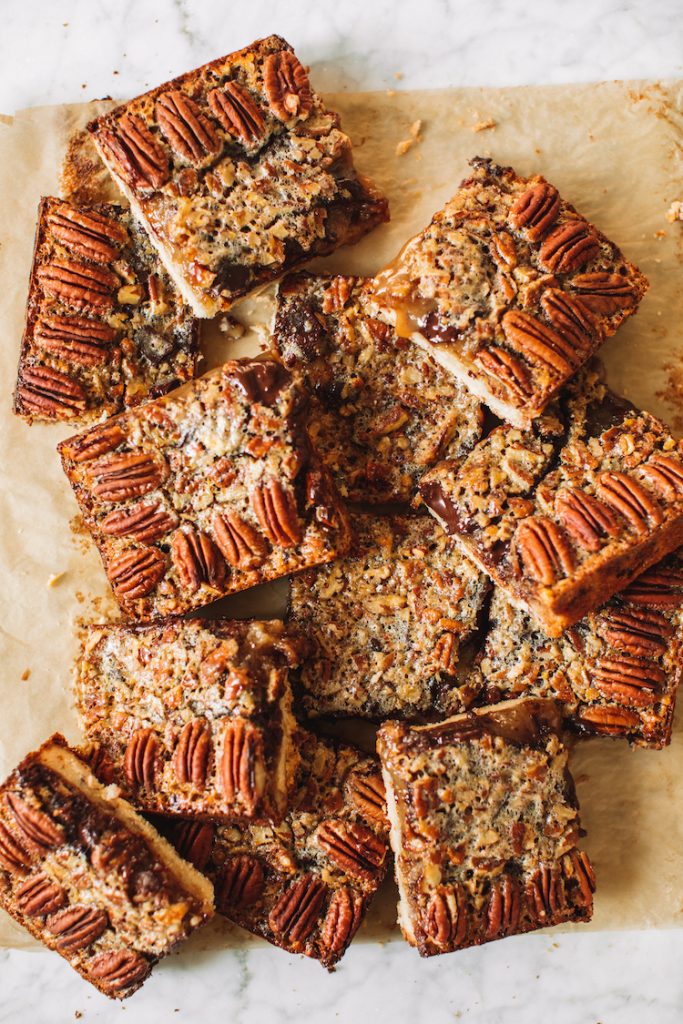
Avoid Blood Sugar Peaks And Dips
Throughout the day, blood sugar levels fluctuate. These fluctuations are normal. In fact, we expect a steady rise in glucose after waking, as our food digests, and even when we exercise. However, we want to minimize really high spikes and equally low dips. In part, because these sugar spikes and crashes don’t make us feel our best. Over time, they can lead to unwanted health conditions. In essence, a healthy blood sugar response is one where we have glucose balance after eating.

There’s No Need To Cut Carbs
You read that right. Thankfully, you don’t have to avoid carbohydrates (especially during the holidays!) to manage your blood sugar. Whole food sources of carbohydrates—like 100% whole grains, fruits, and vegetables—offer the added benefit of fiber. Fiber helps slow digestion and minimize blood sugar peaks. Though most carbohydrates are broken down into sugar molecules, fiber is an outlier. Instead, fiber passes through the body, undigested. In turn, it helps minimize constipation, regulates hunger cues, and reduces the glycemic index. Win, win, win.
Want to nerd out on blood sugar? We have just the resource for you!
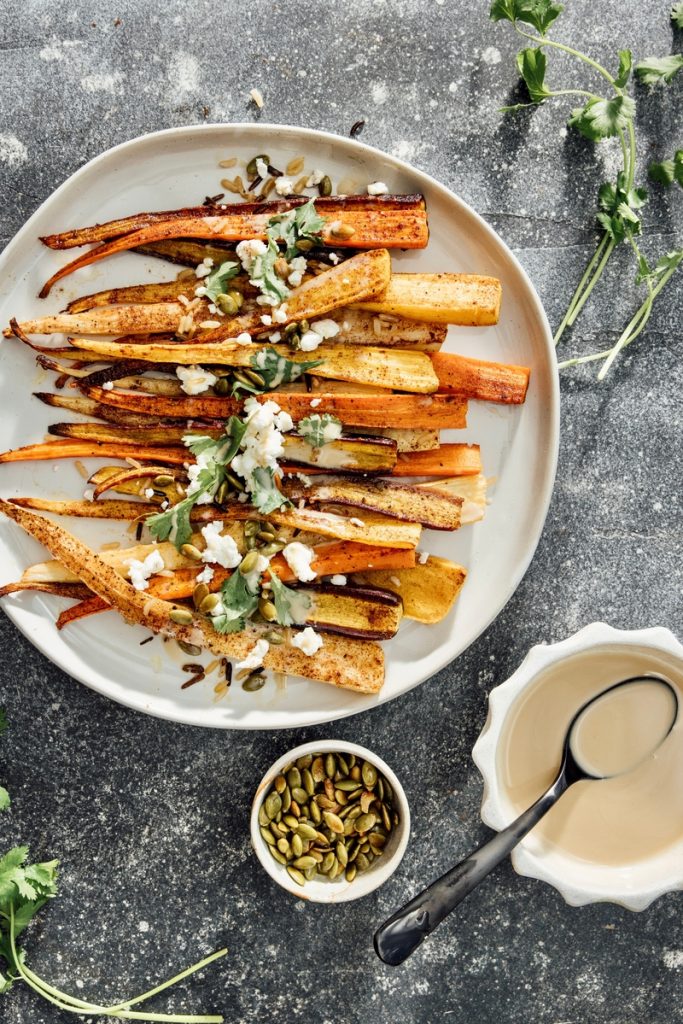
10 Tips To Create A Blood Sugar-Friendly Holiday Season
Without further ado, below are specific tips to keep your blood sugar in check during the holidays. And good news: these tips can be incorporated year-round! Learn how to care for your body while still enjoying the holiday season.
1. Focus On A Balanced Diet
Depending on your holiday plans, there are only a handful of days when you’re likely eating out of the norm. These are special moments spent with special people—enjoy! In the grand scheme of things, the holidays are a blip on the radar. All of that being said, when it comes to the meals surrounding the holidays, a balanced plate is key: aim for half a plate of non-starchy carbs (greens, broccoli, Brussels sprouts, bell peppers, etc.), a fist-sized amount of protein (4-6-oz), 1-2 sources of healthy fats, and a serving (1/2-1 cup) of slow-digesting carbs (oats, quinoa, sweet potatoes, etc.).
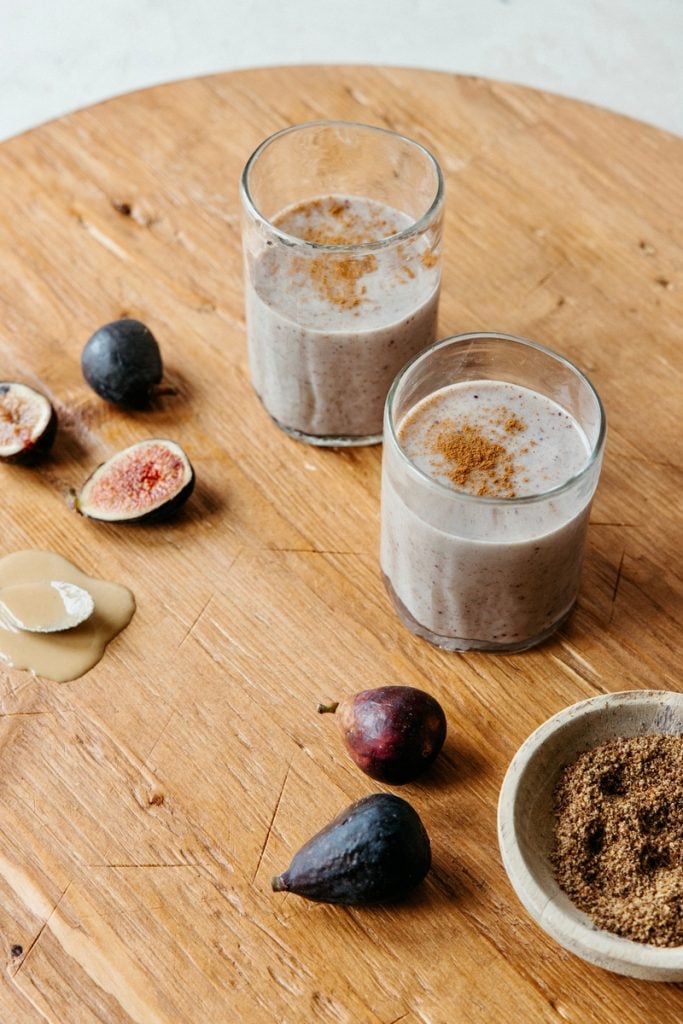
2. Don’t Skip Breakfast
It may be tempting—to save room for turkey—but that’s actually doing more harm than good for your blood sugar levels. When you skip breakfast, you’re running on cortisol. Cortisol, our stress hormone, will cause elevated blood sugar through lunch (and potentially, dinner). The goal is to honor your hunger, but consider whether you’re intentionally suppressing your appetite in the morning. If you wake up and aren’t hungry within 30 minutes to an hour of waking, consider something easy to digest: the adrenal cocktail, a small bowl of chia pudding, or a smoothie.
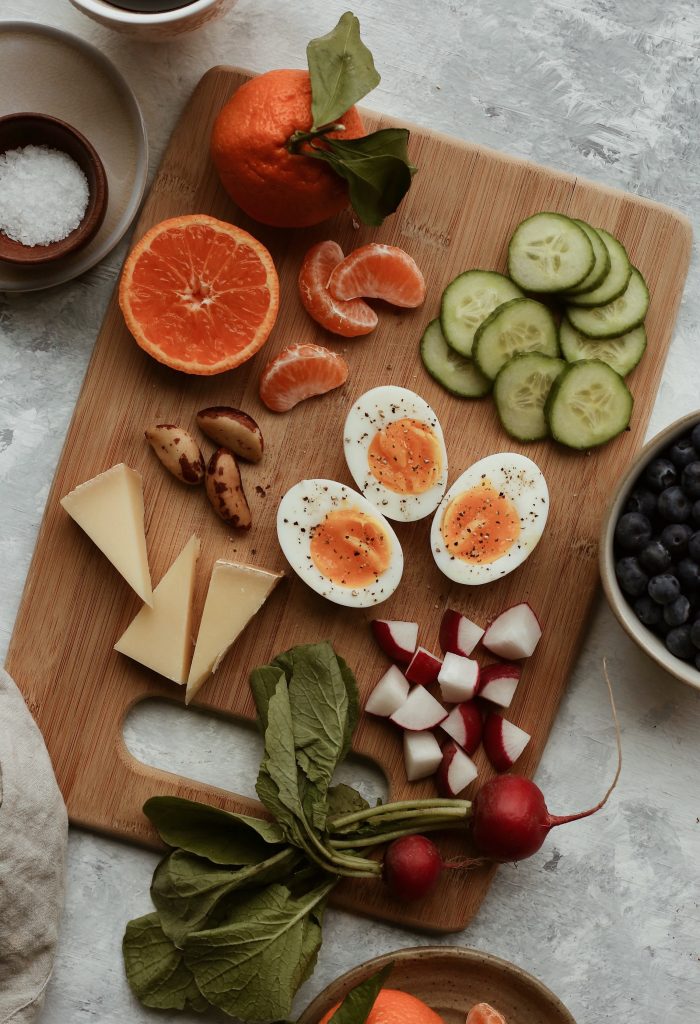
3. Start Your Day With Protein
Speaking of breakfast, opt for a protein-forward morning meal. Starting your day with protein has been shown to stabilize blood sugar and may decrease highs and lows over the course of the day. Protein is satiating, takes longer than carbohydrates to digest, and helps keep blood sugar balanced. When you don’t start your day on a blood sugar rollercoaster, it’s easier to maintain stable glucose levels. For holiday brunch, make a frittata (packed with protein and fiber), consider this fun breakfast board, or bake these banana pumpkin muffins—they’re holiday-inspired without refined sugar.
4. Eat At Regular Intervals
This goes without saying, but aim to eat meals at regular intervals during the day. For most, that’s every 3-4 hours. Skipping breakfast (or any meal) can actually increase blood sugar when you finally sit down to eat. However, eating every few hours helps keep blood sugar in check by not letting it dip too low. Again, stability is the goal. While this isn’t about eating constantly, it is about eating consistently. Curious to know what your blood sugar is doing during the day? Consider wearing a continuous glucose monitor.

5. Manage Stress
Stress elevates cortisol—one of our body’s main stress hormones. This can increase blood sugar and insulin levels. Cortisol also increases secretion of leptin, a hormone that plays a role in appetite control. Leptin secretion can reduce satiety and make you feel more hungry. Holiday stressors are inevitable, but that doesn’t mean you can’t find ways to cherish your rituals, make time for meditation, and set proper boundaries. Whether it be sticking to your budget or politely declining a boozy get-together, take care of mental health in order to help manage your blood sugar.
6. Make A Plan
Worried about the selection of food at your next holiday party? Plan ahead of time. Particularly if you’re heading to a potluck, bring a dish with you that’s both delicious and blood sugar-friendly. For example, these Brussels sprouts. By doing so, you will have at least one nourishing item to round out the other indulgent dishes. However, this isn’t about deprivation. Enjoy what your friends and family members contribute! Rather, it’s about giving yourself the added boost of nutrients to support your blood sugar.

7. Choose Blood Sugar-Friendly Spirits
Alcohol and blood sugar can be a tricky subject (especially if you have diabetes). When you drink alcohol—no matter the type—your liver kicks into gear to metabolize the alcohol. In turn, these substances block the liver from making new glucose. Blood sugars fall and you can quickly dip too low. Research also shows that drinking can affect your blood sugar for up to 12 hours. Ultimately, the best types of alcohol are those with a low sugar or carb content. We have you covered! Otherwise, distilled spirits or hard liquors contain few-to-no carbs. Think gin, rum, vodka, and whiskey.
8. Take Advantage Of Sugar Alternatives
When it comes to baking your favorite pie, bars, cookies, or cake, opt for lower glycemic sugar alternatives. My favorites are monkfruit and allulose. They’re easy to bake with and you won’t taste the difference! Swapping refined sugar (or even maple syrup) for these alternatives can drastically improve your blood sugar response. As we know, the holidays are a sugar bonanza. And too much sugar is a precursor to everything from headaches and bloating to poor sleep, feeling jittery or anxious, and irritability.

9. Don’t Underestimate The Power Of Walking
Moderate, daily movement is beneficial for overall health—but it’s especially helpful for managing blood sugar levels. A moderately vigorous effort for 30 minutes (think: brisk walking, cycling, or strength training) can significantly benefit insulin regulation. All of that to say, a post-meal walk does wonders. In fact, it’s known as the simplest habit to stabilize glucose. In between Thanksgiving dinner and dessert, corral your family and go for a nature walk, throw a football in the backyard, or even encourage a dance party—anything to get moving and grooving.
10. Use Supplements, Strategically
Last but not least, don’t forget about your supplements during the holiday season. Taking high-quality supplements can help increase insulin sensitivity and decrease blood sugar levels. Consider the following supplements to help support stable blood sugar:
- Multivitamin—supports any nutritional deficiencies (common during the holidays!).
- Probiotic—supports gut health, and gut health impacts blood sugar.
- Vitamin D—supports immune and hormonal health.
- Fish oil—helps decrease inflammation.
- Magnesium—helps manage insulin and carbohydrate metabolism.
As always, consult a qualified health care practitioner before starting any new supplements—especially if you are taking medications.
The post A Nutritionist’s Guide to Managing Blood Sugar During the Holidays appeared first on Camille Styles.

0 Comments